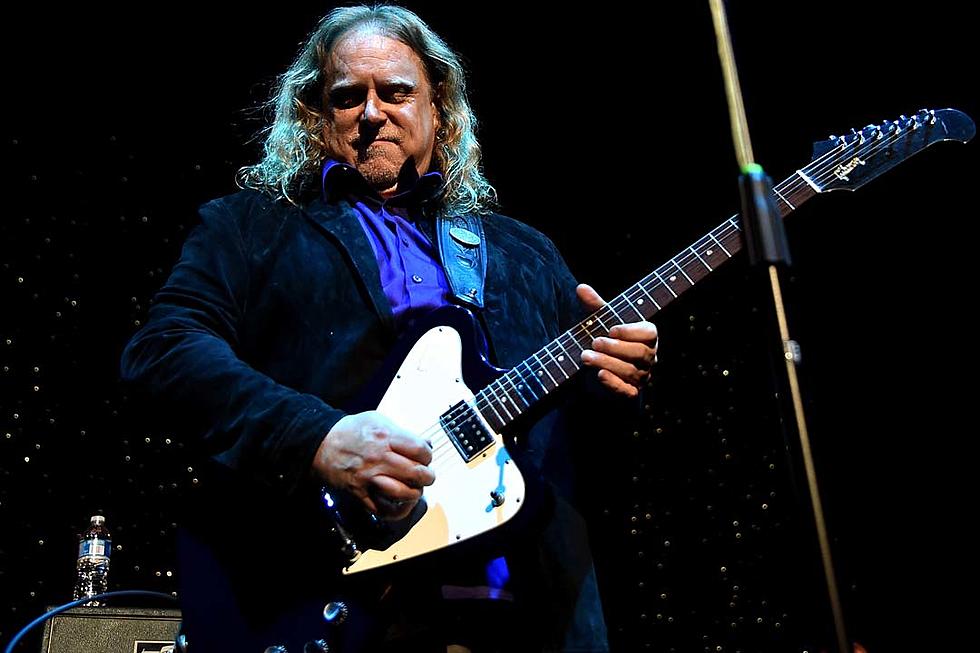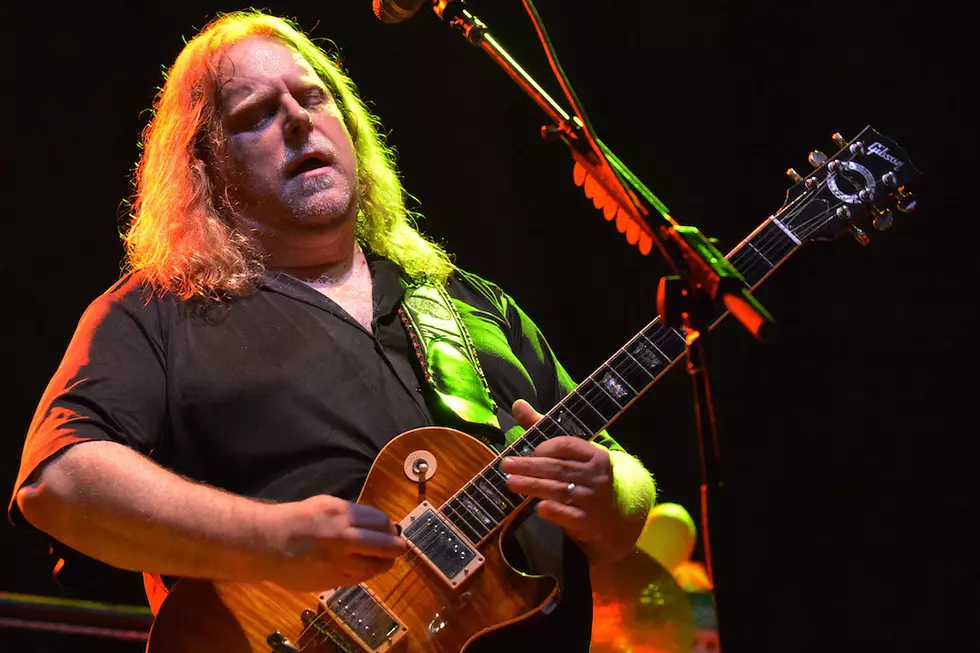Listen to Gov’t Mule’s ‘The Tel-Star Sessions': Exclusive Premiere
Ultimate Classic Rock presents the exclusive premiere of Gov’t Mule’s new archival release The Tel-Star Sessions in advance of its release this Friday. The album features the band's first demo recordings from 1994. You can listen to it above.
It’s an interesting look back at the early days of a band that at the time, was intended to only be a one-off project for singer and guitarist Warren Haynes and bassist Allen Woody, who were both looking to do something outside of their normal work with the Allman Brothers Band. When they began making plans to enter Tel-Star Studios in Bradenton, Fla., with Allman Brothers sound engineer Bud Snyder, for the sessions that eventually took place in June 1994, their only goal was to have some fun.
“In the beginning, Gov’t Mule was just a project," Haynes explains. "We had no designs on being a real band that stays together and makes a second record and a fifth record and a 10th record and tours year after year. We were just doing something for the fun of it. Our intention was to put out a really inexpensive, experimental low-budget record. We went into the studio with our own money and recorded these nine songs, which were virtually the only songs we knew at that time.”
But over the next few months, as Haynes tells Ultimate Classic Rock, things started to change. "There was starting to be an audience and more of a demand for what we were doing, and the feeling within the band was really strong," he recalls. "We were creating all of the time and I was writing more and more new material. It just felt like we were growing so quickly that we decided to not limit the repertoire to just those handful of songs and have the first record include a bunch of the newer stuff that I was writing as well.”
So the decision was made to bring in a proper producer and also get a record company involved. The original recordings were shelved and labeled as demos, even though the band was "in love with a lot of the performances."
"We just felt like they were an important step along the way, [and] that we owed it to ourselves to look at it a little bit differently," Haynes says. "Which is, I think, an important part of the picture. Because we had not yet written the song ‘Mule,’ we had not written ‘Temporary Saint’ or ‘Painted Silver Light,’ all of which appeared on the first record and were important parts of that beginning phase. And then, working with Michael Barbiero" -- who eventually came on board and produced the band's self-titled debut, released a year later in June 1995 -- "which lasted for a decade. We recorded more stuff with Michael than most bands tend to do with one producer, just because we felt very comfortable and he was a big part of the team. So he was a big part of that whole growing process.”
Legendary producer Tom Dowd advised the trio -- which also featured drummer Matt Abts (who had worked with Haynes in the ‘80s in the Dickey Betts Band) -- that they should record live in the studio. His storied history of recording and producing made him a valuable asset of information that the members were happy to be able to tap into as they continued to hone in on what their developing project would become.
“We were fortunate to know Tom very well from our relationship within the Allman Brothers," Haynes explains. "So when Woody and I made the decision that we were going to do these recordings, we sat down with Tom and just picked his brain about how some of those early records were recorded, specifically Cream, because that was the quintessential power trio, so to speak and that’s the void we were trying to fill, was the power trio model that no longer existed in modern music.
“Tom said when Cream recorded, everything was set up in one room and every sound was bleeding into every microphone. That’s part of the overall energy that was being created. It wasn’t like this modern pristine production where everything is totally isolated. We were kind of heading that direction anyway, but when Tom told us that, we said, ‘Okay, that’s the way we want to look at it, wide open.’”
Listening to the performances captured on The Tel-Star Sessions, one thing that sticks out right away is the swagger that is prominently on display with songs like “Rockin’ Horse” and the chemistry and spiritual musical connections that had already developed between Haynes, Woody and Abts as a unit.
“The chemistry was what drove us to do what we were doing and to eventually make the decision that we were going to be a real band as opposed to just a side project," Haynes says. "The first time that we played together, the chemistry was amazing. But with each experience of us playing together, it got better and better and better. We knew there was something special there. It was largely unspoken. When three musicians are just playing and don’t have to talk about how this should sound or how that should feel, especially within the rhythm section of the bass and drums, that’s very uncanny and not something you can experience too many times in your lifetime. The way Matt and Woody played together from the very beginning, it was amazing, and that’s the key to having a trio that can perform on that level and be compared to the great trios of the past.”
Overall, The Tel-Star Sessions presents an intriguing snapshot of where Gov’t Mule began and offer further documentation of the early years with Woody, who died in 2000. The nine recordings also provide an interesting point of comparison when looking at how the band has evolved over 22 years and how Haynes has developed as a singer.
“The sound of my voice has changed and gotten stronger through the years," he notes. "You can instantly hear it’s gruffer and a little more gritty on the early recordings. Also, it wasn’t in the greatest of shape during that time period. We were touring a lot and I was beating my voice up pretty much on a nightly basis. Back then, we had not graduated to a point where we were carrying our own production, meaning where we had the same monitors night after night, so if you got one bad monitor system in one of the venues, your voice would suffer for the next week or so.
"Also, I think it’s important to note that I just kept the original performances that we did. I think some people might have reconsidered that and said, ‘Oh, I can sing it much better now than I did now,’ and gone back and redone them. But I wanted to put these recordings out exactly as they were. Since we had deemed them as demos, we didn’t spend a lot of time and energy and money making them better and better and better, we just kind of put them on the shelf. And then when I heard them recently, I thought, ‘There’s a lot of energy and ferocity coming from those performances that people deserve to hear. ... When I hear those recordings now, I have a smile on my face.”
Gov’t Mule have a busy schedule ahead, starting with dates next week with Blackberry Smoke, which will carry them through the beginning of October. In the middle of the run, the band will also play some dates with ZZ Top.
“I’ve played with Billy [Gibbons] and Dusty [Hill] a few times," Haynes says. "We’re looking forward to this tour that we’re going to do together. I think it’s kind of a nice full-circle thing. I’m glad to see them still doing it all of these years later and keeping what they do alive as part of the overall picture. ZZ Top has reinvented themselves a few times, and very few bands have that opportunity. But everything they do still has the blues as the core of it.”
On the other side of that touring, Haynes says the band will turn its gaze back toward the studio to focus in on the next chapter. “As of now, it looks like Mule is going to go back into the studio toward the end of this year, maybe even as early as October or November, and start working on a new studio record.”
Top 100 Classic Rock Artists
More From KYBB-FM / B102.7










